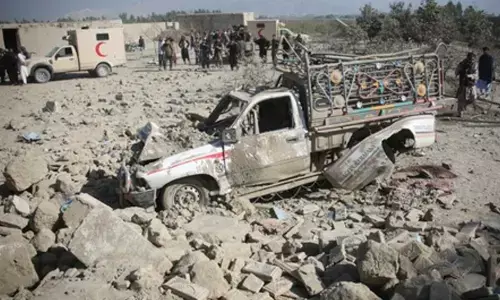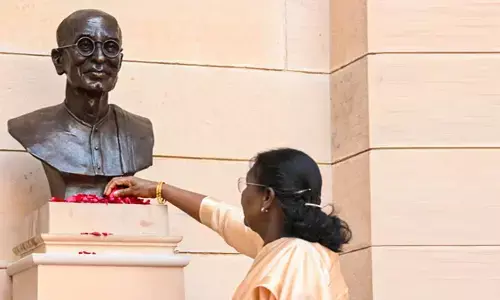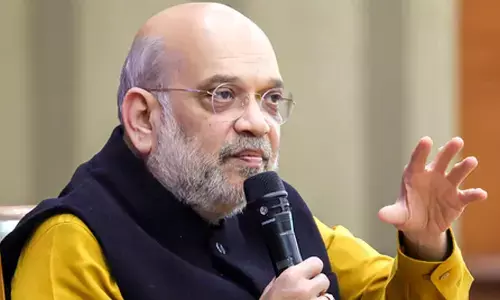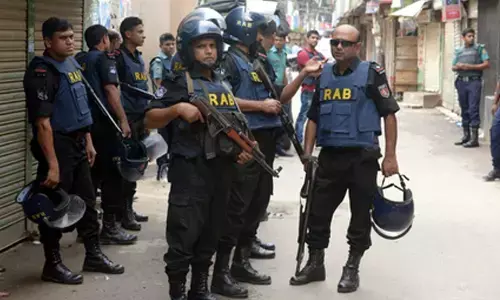Militants in Philippines city dug in for protracted battle
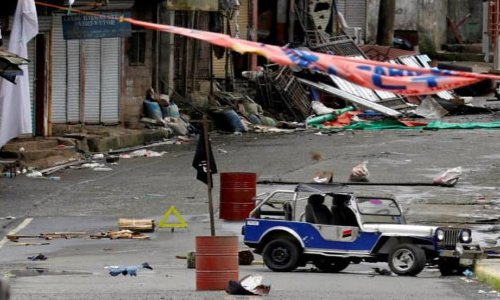
Islamist militants holed up in a southern Philippines town stocked weapons and food in mosques, tunnels and basements to prepare for a long siege, officials said on Monday as the battle for control of Marawi City came to the end of its second week.
MARAWI CITY, PHILIPPINES: Islamist militants holed up in a southern Philippines town stocked weapons and food in mosques, tunnels and basements to prepare for a long siege, officials said on Monday as the battle for control of Marawi City came to the end of its second week.
Their comments underlined the level of organisation among fighters linked to the Islamic State group, whose ranks of several hundred included foreigners from Indonesia, Malaysia, India, Saudi Arabia, Chechnya and Morocco.
By Neil Jerome Morales and Tom Allard | MARAWI CITY, PHILIPPINES Islamist militants holed up in a southern Philippines town stocked weapons and food in mosques, tunnels and basements to prepare for a long siege, officials said on Monday as the battle for control of Marawi City came to the end of its second week.
Their comments underlined the level of organisation among fighters linked to the Islamic State group, whose ranks of several hundred included foreigners from Indonesia, Malaysia, India, Saudi Arabia, Chechnya and Morocco.
ADVERTISING
The battle for Marawi City has raised concerns that the ultra-radical Islamic State is building a Southeast Asia base on the island of Mindanao at the southern end of the Philippines.
Parrying questions on why the fighters had been able to resist an onslaught from the Philippines army for so long, senior officers said the main problem was that 500-600 civilians were still trapped in the urban heart of the town.
Philippines President Rodrigo Duterte said on Saturday that Marawi City would be fully liberated within three days, but on Monday officials were more circumspect on the timing and gave conflicting estimates of how many combatants were holding out.
Major General Carlito Galvez, head of the military command in Western Mindanao region, said as many as 200 fighters from the Maute militant group and others were still inside the town, and had made preparations in advance for a drawn-out standoff.
"In houses we take over, we see .50 calibre, .30 calibre, and the ammunitions are huge. And the Maute, even if they fight two months they will not starve here," he told a news conference about one kilometre from the fighting.
"If you look at it, there are underground tunnels and basements that even a 500-pounder cannot destroy."
He said that days before seizing Marawi City the militants placed supplies in mosques and madrasas, the religious schools of a town whose population of over 200,000 is overwhelmingly Muslim in a country where the majority of people are Christians.
TRAPPED CIVILIANS LOW ON FOOD AND WATER
The area of the town occupied by the militants had shrunk to less than 10 percent, military spokesman Brigadier General Restituto Padilla told a news conference, adding that the army was pressing on to meet Duterte's deadline but it was not easy.
"Complications have been coming out: the continued use of civilians, potential hostages that may still be in their hands, the use of places of worship ... and other factors that complicates the battle because of its urban terrain," he said.
Military choppers made combat sorties and machinegun fire rattled and smoke billowed in a neighbourhood of the town on Monday, Reuters correspondents said.
A four-hour ceasefire to evacuate residents was marred by gunfire on Sunday, leaving hundreds of civilians who had hoped to flee the fighting stuck in their homes.
Padilla said that 1,467 civilians had been rescued so far, and the 500-600 still trapped were low on food and water.
"There are places which we use as passageways to enemy territory - when we reach those areas, sometimes we see old people who are weak, cannot move on their own, because of lack of food," he said.
A presidential spokesman said 120 militants have died in the battle, along with 38 government forces. The authorities have put the civilian death toll at between 20 and 38.
President Duterte, who launched a ruthless 'war on drugs' after he came to power a year ago, has said that the Marawi fighters were financed by druglords in Mindanao, which has been roiled by banditry and separatist insurgencies for decades.
After the Marawi siege began Duterte declared martial law in Mindanao, an island the size of South Korea with a population of 22 million. Six opposition lawmakers on Monday challenged the imposition of martial law in a petition to the Supreme Court, but his allies in Congress have supported the move.




